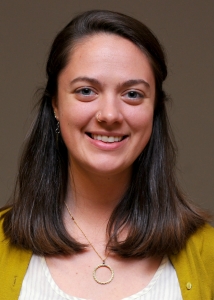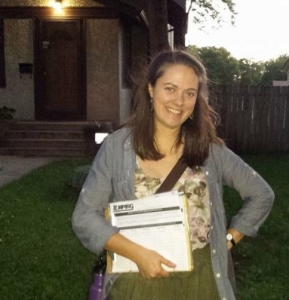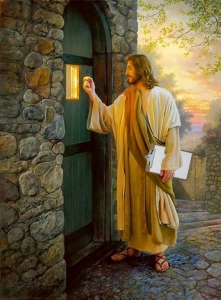 By Emilie Bouvier, Congregational Organizer for Environmental Justice
By Emilie Bouvier, Congregational Organizer for Environmental Justice
“Knock and the door shall be opened unto you.” As an emerging environmental organizer, I have many hours of stories about “on door” exchanges – comical moments, connections of surprising depth, harsh words, encouraging support, and a wide variety of snacks shared with me in moments of grace.
Door knocking has deeply impacted my theology. It has re-oriented my thoughts on working for positive change within faith communities.
I bring months of experiences spent talking about “doors” and asks” – with literal callouses on my knuckles – to my reading of Luke 11:1-13. Last Sunday’s lectionary text goes right from the Lord’s Prayer to this curious story about knocking on doors. We often read this text as a “me-and-God” text – about a personal relationship with God, who comforts and provides. But now I hear this text anew as an organizing text.
THE STORY IS central, with Jesus beginning in verse 5: “Suppose one of you has a friend, and you go to him at midnight and say to him, ‘Friend, lend me three loaves of bread; for a friend of mine has arrived, and I have nothing to set before him.’” Notice that the one who goes at midnight to knock on his friend’s door doesn’t ask for something for himself;  rather he asks on behalf of a friend who is in need and is hungry. He acts out of love for a neighbor, responding with urgency to the particular need.
rather he asks on behalf of a friend who is in need and is hungry. He acts out of love for a neighbor, responding with urgency to the particular need.
Door knocking has deeply impacted my theology.
Jesus goes on to describe the response, one that is almost verbatim one I’ve heard said to me many times over in my days knocking doors: “And he answers from within, ‘Do not bother me; the door has already been locked, and my children are with me in bed; I cannot get up and give you anything.’”
But this is not the end of the story. Jesus continues, “I tell you, even though he will not get up and give him anything because he is his friend, at least because of his persistence he will get up and give him whatever he needs.”
Let’s unpack the dynamics of these interactions. Our nameless protagonist is a bridge who has relationship and is asking from one to fill the need for another. This is what community organizing is all about: building a caring community that attends to the needs and problems we face, and acting out of that network of people and resources for the greater good.
Yet, the sleepy friend doesn’t want to get up, doesn’t want to respond. So our protagonist continues knocking, louder even, being persistent. This determined one continues to lift their voice and make noise so that others will start to hear. Make enough noise and those nearby will either respond or make sure this friend who isn’t helping steps it up. Everyone wants to finally get to bed after all.
 This kind of persistence is critical in organizing for justice. It’s founded in relationship and it’s used intentionally to get results. Do we care enough to put pressure on those we know can help – for the sake of building a bridge and meeting a need? Can we strategically and passionately refuse to shirk away quietly but rather lift our voices and make noise until our friend is roused from sleepiness to share the resources they have that another is lacking?
This kind of persistence is critical in organizing for justice. It’s founded in relationship and it’s used intentionally to get results. Do we care enough to put pressure on those we know can help – for the sake of building a bridge and meeting a need? Can we strategically and passionately refuse to shirk away quietly but rather lift our voices and make noise until our friend is roused from sleepiness to share the resources they have that another is lacking?
I find that this story about door knocking informs and is informed by the prayer Jesus teaches immediately before it as well. It invites naming this Holy One through relationship, the coming of a new kingdom, a new realm in which the ways we relate to one another are transformed, for everyone to have enough bread, and for our brokenness and broken relationships to be restored – a prayer that supports and encourages community grounded in relationship with God and one another so that all are valued, nourished, and whole.
The Lord’s Prayer invites a new realm in which the ways we relate to one another are transformed, for everyone to have enough bread, and for our brokenness and broken relationships to be restored.
So what does all this have to do with environmental justice? Well, if we look at the greater community, we find many friends who have specific need, for whom we ought to probably knock on some doors. We see people without access to our changing renewable energy economy. We see the devastation caused by pollution, in big and small ways, including right in our own city and countryside. We see people displaced or hungry because of climate instability and its effects on food production, storms, and flood patterns.
So how will you knock? Will you claim your voice to be a connector so that everyone is cared for? And when someone else calls, will you stumble out of bed even when you feel tired because we all do better when we work together to establish the beloved community?
We have work to do and community to build, so let’s get knocking.
